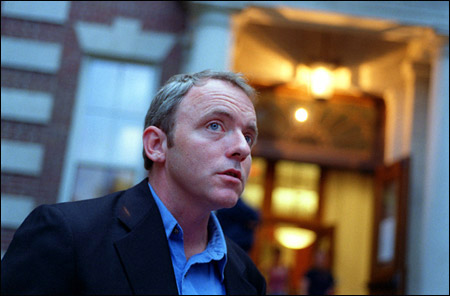Lehane speaks at Summer School:
Boston’s own novelist will teach at Extension School this year

With his sixth novel, “Mystic River,” landing on bestseller lists and soon to be released as a Clint Eastwood-directed film, Dennis Lehane is, without a doubt, a successful writer.
Yet the Dorchester native is not so many years beyond parking cars for a living that he’s lost vivid recall of his writing roots.
Lehane shared experiences from both ends of the spectrum – from partying with Hollywood luminaries to living on such limited means that writing was the only entertainment he could afford – at a lecture sponsored by the Harvard Summer School Writing Program on July 28. Lehane will teach fiction at the Harvard Extension School this coming year.
Along the way, he gave the many writing students in the audience a glimpse into his own writing process, from research methods to revising drafts to creating characters and plot. He credited his literary success, and the financial spoils that lagged behind, to an unswerving commitment to his craft.
“I treated it as a religion,” he said, recalling how he declared himself a writer when he began to pursue a creative writing degree. Being published, he stressed, is not a condition of being a writer.
Sparkling with self-deprecating, townie-gone-to-grad-school wit, Lehane described how he walked away from a job working with abused children and steered clear of other potentially fulfilling careers because their demands interfered with his writing.
Instead, he paid his bills with low-pressure, unglamorous employment like waiting tables and parking cars. “You don’t take parking cars home with you,” he explained.
An early brush with literary fame came when he dented John Updike’s car. “It’s true,” he told the audience conspiratorially, adding, “All the guys at the garage said, ‘Who’s John Updike?’”
While he continued to park cars even after his first book, “A Drink Before the War,” came out, it took until the publication of his fifth book, “Prayers for Rain,” for his father to stop reminding him of upcoming postal exams or public works job openings.
A love of Boston’s neighborhoods
After abandoning undergraduate study at Emerson College and the University of Massachusetts and “knocking around the South,” eventually completing the M.F.A. in creative writing, Lehane returned to Boston in 1993. “I missed autumn leaves and people getting my jokes,” he said.
He found his voice in his love of Boston’s neighborhoods, a love he described as “true because I think it was not blind.” The changes in his hometown, sparked by the real estate roller coaster that had peaked, dived, and climbed again since he left in 1985, planted the seed for “Mystic River.”
Living in Charlestown, where the neighborhood’s infamous tribalism and code of silence existed alongside apartments gone condo and trendy restaurants like Olive’s, Lehane charted change with the familiarity of an insider and the fascination of a recent outsider.
With “Mystic River,” he said, he set out to write “a tone poem to a vanishing world,” one dotted with mom-and-pop stores and Irish bars that were still dumps.
“Mystic River,” Lehane’s first novel not to feature the crime-fighting characters Patrick Kenzie and Angela Gennaro, took two and a half years to finish.
“I came as close to a nervous breakdown as an Irishman can come,” said the author. As with all his novels, he showed his first draft to no one and wrote seven or eight revisions before he – and his publisher – considered the project completed. His publisher assured him the novel was beautiful but wouldn’t sell. For his part, Lehane was certain about one thing: he would never relinquish the film rights to “Mystic River.”
“Mystic River” did sell, of course. And in October, the film will be released. Lehane turned down many would-be directors but failed to resist Eastwood, who called the author after borrowing “Mystic River” from a friend.
“To this day, that freaks me out: Clint Eastwood borrowing a $25 book,” said Lehane.
Lehane praised Eastwood’s vision, which neatly aligned with his own, and his careful direction of “Mystic River.”
Reading, revising, ‘Bull Durham’
Acknowledging that “my career track is really pathetic. It’s completely a case of falling butt-backward into luck,” Lehane nonetheless offered advice and insight into the writing process. He encouraged writers to discover their strengths – no writer excels at all elements of writing – and mine them. He considers his talents to lie in dialogue, a sense of place, and character development.
“I get all these characters and I build them, then I say, ‘Go get me a plot.’ They’re usually very nice about it,” he said. Plotting doesn’t come easily to him, Lehane said, but writing crime fiction takes him off the hook by providing a natural drama.
“If it were up to me, my books would be 400 pages about two guys sitting in a room talking about nothing,” he said.
Reading, revising, and writing poetry are other cornerstones of Lehane’s discipline.
A self-described movie fanatic, Lehane shared his obsession with the 1988 film “Bull Durham.” After many viewings, he said, he’s discovered that any of the film’s baseball guidance could be applied to writing. His favorite line from the movie – and for writing – is “You’ve got to play this game with fear and arrogance.”
“Fear apathy. Don’t fear anything else,” he said, describing his glee at a poetry reading he did that had people running, not skulking unnoticed, from the audience. “The more people you offend, the better.”
The Harvard Film Archive will host the Boston-area premiere of ‘Mystic River’ on Oct. 8 at Sanders Theatre.




